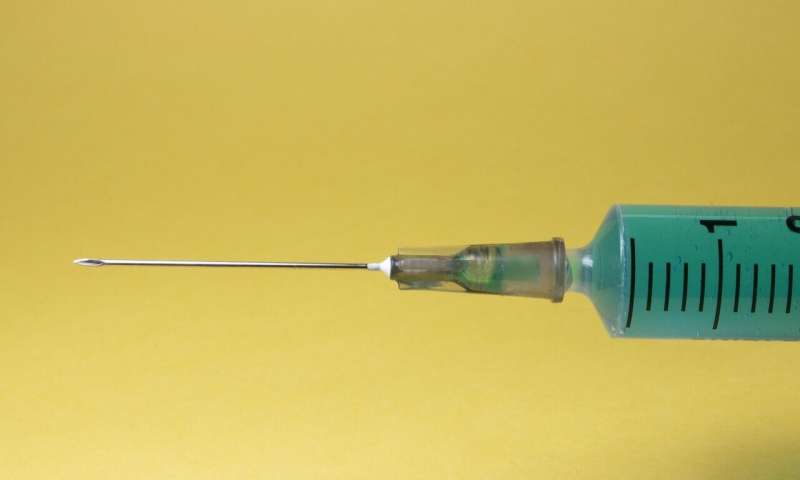This article has been reviewed according to Science X's editorial process and policies. Editors have highlighted the following attributes while ensuring the content's credibility:
fact-checked
peer-reviewed publication
trusted source
proofread
Meningococcal vaccine found to be cost-effective at protecting men against gonorrhea

Protecting men who have sex with men against gonorrhea with the 4CMenB meningococcal B vaccine is cost-effective; Imperial College London study finds
Gonorrhea is a sexually transmitted disease which is caused by infection with the Neisseria gonorrhoeae bacterium. Previous studies showed that the 4CMenB meningococcal vaccine (also called Bexsero) partially protects against gonorrhea.
This mathematical modeling study by Imperial College London, published in The Journal of Infectious Diseases, combines data on disease transmission and economics to evaluate the cost-effectiveness of vaccinating men who have sex with men (MSM) with 4CMenB to protect against future gonorrhea infection.
To be cost-effective, vaccination has to be offered to those who are particularly at risk of gonorrhea. Offering vaccination to patients diagnosed with gonorrhea to reduce their risk of getting another infection can prevent 57,000 cases over 10 years and is cost-effective.
Expanding the eligible group to include not only those with current infection but also uninfected individuals attending sexual health clinics who report more than five sexual partners per year is even more cost-effective. This approach could prevent 140,000 gonorrhea cases over 10 years.
This study also examined the importance of variation in the population regarding how people feel about vaccination because this affects how many people ultimately get protected. In an "optimistic" scenario, the number of gonorrhea cases prevented is 30%-60% more than in a "pessimistic" scenario.
The authors demonstrate that a vaccination program using 4CMenB does not need to achieve a minimum level of uptake to be cost-effective, although promoting vaccine uptake can increase the impact and value of the program.
The UK's Joint Committee on Vaccination and Immunisation (JCVI) has advised using the 4CMenB vaccine to protect men who have sex with men against gonorrhea, and the UK government is currently considering this advice.
Prof Peter White, MRC Centre for Global Infectious Disease Analysis, Imperial College London, said, "We have examined for the first time how variation in the way people feel about vaccination in the community of men who have sex with men would affect the impact and cost-effectiveness of using 4CMenB to protect against gonorrhea and it amounts to tens of thousands of cases and millions of pounds over a decade."
"Currently, we don't have information, so we recommend community engagement activities and studies to understand the range of views so that we can make vaccination as effective as possible."
Dariya Nikitin, MRC Centre for Global Infectious Disease Analysis, Imperial College London, said, "We have a gonorrhea epidemic at present, and offering the 4CMenB vaccine to at-risk men who have sex with men could greatly reduce the number of cases. Vaccination would be cost-saving because reduced costs of managing gonorrhea cases outweigh the costs of the vaccination program."
More information: Peter J. White et al, Cost-effectiveness of 4CMenB vaccination against gonorrhea: importance of dosing schedule, vaccine sentiment, targeting strategy, and duration of protection, The Journal of Infectious Diseases (2024). DOI: 10.1093/infdis/jiae123

















